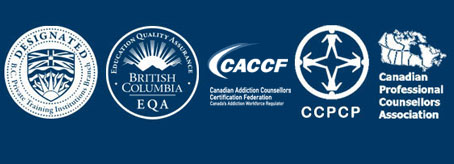Opportunity Just Ahead...

Congratulations, graduates!
You worked hard to earn your Diploma. Now you’re ready to move to the next level and apply for ‘Professional Designation’.
Is designation necessary? That depends on the career direction you intend to take. The letters behind your name will signify to clients and colleagues that you have met the competency and ethical standards required for membership in a regulatory college, and/or a professional association.
What are the benefits? Professional designation will help you obtain liability insurance; maintain a competitive edge in the job market; and is essential if you plan to work in private practice.
Depending on your career aspirations, you may choose to apply for more than one type of designation. A Diploma from KCPC qualifies you to apply for professional designation from several sources such as:
- The Canadian College of Professional Counselling and Psychotherapy (CCPCP), is a national, self-regulatory college inclusive of a wide range of mental health practitioners dedicated to safeguarding consumers of mental health services. The letters, ‘CCPCPr’, stand for ‘Registrant’ with the Canadian College of Professional Counselling and Psychotherapy’. Student and Candidate memberships are also available.
- The Canadian Professional Counsellors Association(CPCA) grants the designation of ‘RPC’ (‘Registered Professional Counsellor). CPCA members meet rigorous standards for education and clinical experience, and are held to the highest ethical standards of the profession. Student and Intern memberships are also available. A qualifying exam is required. For details on membership criteria and fees see thecpca.ca.
- Association of Cooperative Counselling Therapists (ACCT) is a competency-based counselling community committed to growth and development of its members across Canada. Their ethical framework is built around their code of ethics, scope of practice and standards of practice. It is their belief that a combination of knowledge, experience, skill and compassion are fundamental to the counselling process. ACCT welcomes all qualified counsellors and psychotherapists to join their membership and receive the designation of Registered Therapeutic Counsellor – Candidate (RTCc), Registered Therapeutic Counsellor /Accredited Counsellor (RTC/AC), Master Therapeutic Counsellor (MTC) and Registered Counselling Supervisor (RCS). Student membership is available for those who are still in school. Criteria for membership can be found here - Association of Cooperative Counselling Therapists of Canada - Counsellor Criteria (acctcounsellor.com)
Criteria for membership and fees are posted on the website: www.ccpcp.ca KCPC graduates are exempted from taking their qualifying exam when applying for membership.
Acquiring professional recognition is as simple as that... You put in the effort to earn your Diploma of Applied Psychology and Counselling, and KCPC stands behind you as you take the first steps toward an exciting career as a professional counsellor.
A note on Provincial regulations:
Most Canadian provinces permit KCPC graduates who are members of a professional association (such as the CCPCP, the ACCT, or CPCA) to offer counselling services to the public. However Ontario, New Brunswick, Alberta, and Nova Scotia require registration with the provincial regulatory college to provide specific types of mental health therapies. (Please check directly with your home province for any restrictions that may apply.)
If you intend to practice psychotherapy you must meet specific requirements in education, competence, and clinical experience. Courses offered through KCPC’s Psychotherapy Diploma program meet the number of training hours for required in most provinces. Clinical experience and other requirements are to be completed outside of the Diploma program.
For registration requirements in Ontario see: www.crpo.ca
KCPC is an Associate member of the CCPCP, the CPCA, and the ACCT. We encourage all graduates to seek professional designation with a recognized national regulatory college and/or professional association. The designation you pursue will depend on your area of specialization, membership criteria, fees, and benefits. The choice is up to you.






